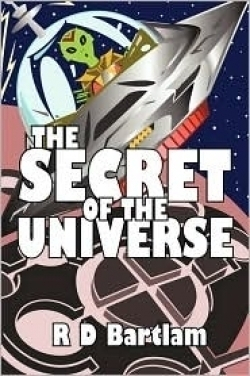The Secret of the Universe
Book One
In R D Bartlam’s debut novel, The Secret of the Universe, absent-minded yet affable British scientific genius Stuart Langham and his like-minded tween daughter, Kerry, labor for many years at a shady company called Computek to learn the mystical process of making matter levitate. Upon perfecting the process of making things float, father and daughter find themselves facing threats from their villainous bosses, who want the technology for themselves. At the same time, the Langhams discover Kerry’s favorite band, the Aliens, are, in fact, beings from outer space who have come to warn the duo of the consequences of their gravity-defying secret. Suddenly, the Langhams are caught up in an intergalactic adventure.
Although only young British readers will likely understand all of Bartlam’s cultural references and slang, young English-speaking alien aficionados from everywhere will enjoy the fast-paced narrative’s mixture of slapstick and action. In a genre too often dominated by swashbuckling boys, readers will find it refreshing to find an intelligent capable female in Kerry—a girl who saves the day instead of becoming a damsel in distress. In another welcome departure from the norm, there exists no extraneous love interest for Kerry to detract from her affectionate relationship with her father. Moreover, the intelligent space aliens—the Kaleesh—look like insects instead of humanoids. In the Kaleesh’s world, the pesky hominids are analogous to our insects.
While there is enough in this story for a young reader of either gender to enjoy, several problems plague this otherwise promising premise: The first of these being a needlessly intrusive omniscient narrative voice that redundantly underscores plot points that are already apparent in the text. This same narrative voice also makes useless comedic throwaway asides. These narrative quips pale in comparison to the story’s comedic action scenes. In addition, much of the Langhams’ research and the duplicitous nature of Computek is told in summary paragraphs, as opposed to being shown to the reader in illustrative scenes. Such summary is a shame, because the author clearly has a humorous inventive imagination.
Furthermore, the villains—both human and alien—are not vanquished effectively, and the evil enemies from outer space revel in flatulence—a trait that makes them seem cartoonish, instead of seeming like the vicious cannibals the author intends for them to be. Indeed, a chapter near the end of the book suggests that the alien enemy is gearing up for an assault on the Langhams and the Kaleesh—an attack that ultimately never materializes. Perhaps such a confrontation will occur in the sequel. Additionally, an overuse of apostrophes and inconsistent capitalization make this otherwise sound story seem amateurish. In conclusion, Bartlam’s book is a worthy effort, and one hopes that these editing errors will be smoothed out in future installments of the series.
Reviewed by
Jill Allen
Disclosure: This article is not an endorsement, but a review. The publisher of this book provided free copies of the book and paid a small fee to have their book reviewed by a professional reviewer. Foreword Reviews and Clarion Reviews make no guarantee that the publisher will receive a positive review. Foreword Magazine, Inc. is disclosing this in accordance with the Federal Trade Commission’s 16 CFR, Part 255.

